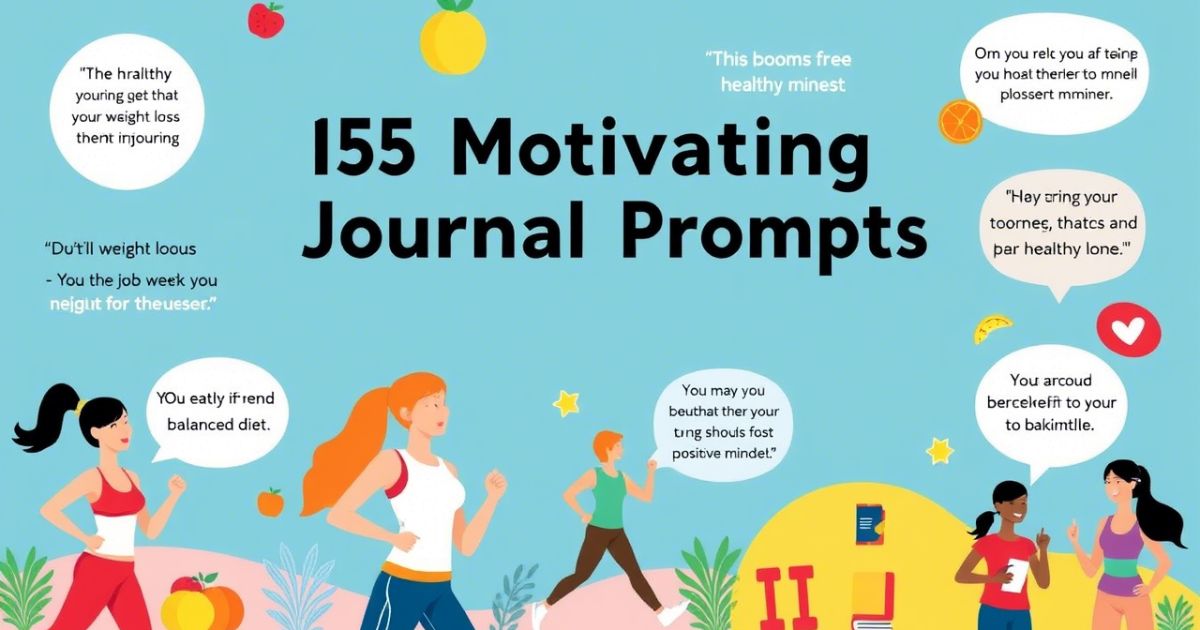Struggling to stay on track with your weight loss goals? Journal Prompts For Healthy Weight Loss can help. Writing things down makes a big difference. It keeps you focused, motivated, and aware of your habits. That’s where journal prompts for weight loss come in. They guide your thoughts, track progress, and boost confidence. These simple questions help you understand your eating, feelings, and daily choices. Using weight loss journal prompts helps you reflect and grow.
You don’t need fancy tools. Just a notebook and a pen are enough. With the right weight loss journal ideas, you can explore your emotions, set clear goals, and build better habits. Feeling stuck? Try motivation weight loss journal ideas to push through hard days. Journaling for weight loss builds self-awareness and keeps you grounded. The more honest you are the better it works. These Journal Prompts For Healthy Weight Loss are perfect for your journey.
Mindful Eating Journal Prompts For Weight Loss

Mindful eating is a powerful habit that helps you focus on how and why you eat. It teaches you to slow down and be present during meals. This approach improves your relationship with food. It also supports better decision-making. When you understand your eating patterns, it’s easier to create healthy changes that last.
Using journal prompts can guide your thoughts and build better eating habits. Writing makes you more aware of what you eat and why. Mindful eating journal prompts help you reflect on emotions, hunger cues, and satisfaction levels. This kind of journaling is different from strict calorie tracking. It’s about learning and growing, not punishing yourself.
Before meals, pause and ask simple questions. Am I really hungry? What emotions am I feeling? What does my body need right now? These mindful moments stop compulsive eating. They help you eat with intention, not out of stress, boredom, or routine.
During meals, stay connected to your food. Ask yourself: How does this taste? Am I eating too fast? Am I still enjoying it? Checking in like this prevents overeating. It turns mealtime into a calming, enjoyable experience. You stay present and learn to stop when you’re full.
After eating, journal about how you feel. Was the meal satisfying? Did you eat because of hunger or emotion? Were you distracted? These prompts build awareness and reveal patterns. Over time, you start noticing what works and what doesn’t. That insight is key for lasting change.
These small questions help you understand your cravings and behaviors. They support healthier choices and reduce food guilt. Combined with Journal Prompts For Healthy Weight Loss, mindful eating journaling can completely shift your mindset around food. You become more in tune with your body and emotions.
In the end, mindful eating is about balance, not perfection. It’s not a diet, it’s a practice. Let your journal become a trusted space for growth. Use it to explore your relationship with food, understand emotional triggers, and stay motivated. With time, these daily reflections can lead to powerful, lasting weight loss.
Related Guide:
560 Negative Words That Begin With The Letter L
72 Mindful Eating Journal Prompts For Weight Loss
- “What emotions do you have when you think of planning your meals, buying groceries, cooking?”
- “How do you feel when you sit down to eat?”
- “Do you tend to eat more when you’re feeling stressed? Why?”
- “What are the main reasons you eat when you’re not physically hungry?”
- “How does your body feel when you eat different types of food?”
- “Do you often eat while watching TV or using your phone? How does that affect your eating habits?”
- “When you feel full, do you continue eating anyway? What motivates that decision?”
- “What kinds of food make you feel energized and satisfied?”
- “How do your emotions affect your food choices throughout the day?”
- “What role does comfort food play in your life?”
- “How do you feel after eating a meal that makes you feel good?”
- “Do you notice any patterns in your eating habits when you’re feeling anxious?”
- “How do your family or cultural traditions influence your eating habits?”
- “How often do you eat because you’re bored rather than hungry?”
- “What is your relationship with snacking like throughout the day?”
- “How do you feel about eating meals in a rush versus taking your time?”
- “When was the last time you truly savored your food? What made that moment special?”
- “How often do you check in with your hunger before eating?”
- “What thoughts cross your mind when you see a food commercial or ad?”
- “How do you feel about food labels and their impact on your choices?”
- “What is the first thing you think about when you open the fridge?”
- “How do you feel about the idea of eating mindfully?”
- “When you’re out to eat, how often do you pay attention to portion sizes?”
- “What emotions do you experience when you can’t find the food you want to eat?”
- “How do you feel after eating something you regret?”
- “When you eat, do you think about how the food makes you feel afterward?”
- “Do you often feel guilt after eating certain foods? Why?”
- “How do you manage cravings that happen during stressful moments?”
- “Do you feel more satisfied with whole foods or processed foods?”
- “What does your body need more of—rest or food?”
- “How do you feel when you eat to nourish your body, not just to fill hunger?”
- “Do you tend to eat more when you’re feeling sad or lonely?”
- “What part of your day are you most likely to overeat?”
- “How does being around others while eating influence how much you eat?”
- “Do you eat to celebrate, or do you celebrate with food?”
- “What does eating feel like when you’re truly listening to your body’s hunger signals?”
- “How often do you stop eating when you are no longer hungry?”
- “How do you feel after eating a large meal versus a smaller one?”
- “What foods are hardest for you to stop eating once you start?”
- “How does your body react to too much sugar or caffeine?”
- “When you eat something healthy, how does it make you feel afterward?”
- “What are the triggers that make you want to eat when you’re not hungry?”
- “Do you find that your mood changes after eating a certain type of food?”
- “How do you feel about food in terms of health versus pleasure?”
- “What is your favorite way to eat without distractions?”
- “Do you enjoy the process of preparing your meals? Why or why not?”
- “When you eat out, how do you make healthier choices?”
- “How do you feel when you’re trying a new food or recipe?”
- “What makes you feel proud of your eating habits?”
- “How do you deal with food cravings when they hit?”
- “When you eat with others, how does it affect your food choices?”
- “What foods do you tend to overeat even though you know you shouldn’t?”
- “How do you feel when you’re eating foods you truly enjoy?”
- “What is your relationship with food when you’re feeling tired or drained?”
- “How do you manage eating when you’re feeling overwhelmed?”
- “How do you feel when you eat a meal and feel satisfied afterward?”
- “What is your favorite food to eat when you want to feel comforted?”
- “How do you feel when you make time for meals, rather than eating on the go?”
- “How does your body feel after you eat a healthy, balanced meal?”
- “What does eating feel like when you’re listening to your hunger cues?”
- “What types of foods help you feel most satisfied after a meal?”
- “How often do you eat past the point of feeling full?”
- “What emotional triggers lead to unhealthy eating for you?”
- “How do you feel when you’re eating mindfully, without distractions?”
- “What part of the day do you feel the most hungry, and why?”
- “What emotions do you feel when you eat comfort food?”
- “How do you feel about the concept of eating to nourish your body?”
- “How do you feel when you eat foods that align with your health goals?”
- “What foods make you feel lighter and energized after eating?”
- “How do you feel about skipping meals? What does it do to your body?”
- “How do you manage moments when you’re eating out of habit rather than hunger?”
- “What role does self-compassion play in your eating habits?”
Fitness Journal Prompts For Physical Well Being

Fitness journaling is a powerful way to track your physical well being and progress. By taking a moment each day to write down your workouts, goals, and feelings, you can create a deeper connection with your body. The practice of keeping a fitness journal not only helps you monitor your physical activities but also encourages self reflection. Writing about how your body feels after exercise or how a particular routine affects you mentally can make your journey toward physical well-being more mindful.
One of the best ways to stay motivated in your fitness routine is by using Journal Prompts For Healthy Weight Loss. These prompts help you focus on your physical achievements and challenges. Whether you’re tracking your exercise routines or reflecting on how a new diet plan is making you feel, journaling helps build awareness. It serves as a tool to identify what works for you and what doesn’t. Over time, this mindfulness leads to better choices and sustained motivation.
When you sit down to write in your fitness journal, take the time to reflect on your workouts. Ask yourself questions like: How did my body feel during the workout? Was I pushing myself hard enough, or did I need to slow down? Reflecting on these things helps you understand your physical limits and progress. It’s not just about numbers or calories burned; it’s about how your body responds and what feels good.
It’s also helpful to track your physical energy levels. Keeping a record of how you felt before and after exercise can provide insights into how well you’re fueling your body. If you find that you consistently feel sluggish, it might be time to adjust your nutrition or exercise routine. Your fitness journal acts as a roadmap to your energy levels and overall health.
A fitness journal can also help you reflect on your fitness goals. Writing down both short-term and long-term goals can guide you toward a balanced fitness plan. Whether you’re aiming to increase strength, flexibility, or stamina, journaling about your aspirations can serve as a constant reminder of what you’re working toward. With each workout, make sure to note the progress you’re making. Celebrating small victories builds momentum for bigger achievements.
Beyond workouts, your fitness journal should reflect your overall well-being. Consider how your mental health connects to your physical activities. Does exercise help reduce stress or improve your mood? Journaling allows you to make these connections, which enhances your understanding of how fitness impacts your life outside the gym. The more aware you are of these effects, the more likely you are to stick with your routine.
Incorporating Journal Prompts For Healthy Weight Loss into your fitness journal can bring additional clarity to your journey. These prompts can guide your reflections on nutrition, sleep, and recovery. For example, how did your meal choices affect your energy during a workout? Did you sleep well the night before your session? These questions bring a holistic perspective to your fitness journey, focusing not just on exercise, but on the factors that support physical well-being.
Another powerful aspect of fitness journaling is its ability to track patterns. If you notice certain trends, like feeling extra tired after a specific type of workout, you can address these issues directly. You may find that a different routine, diet, or rest schedule could make a difference. By consistently journaling, you can identify habits that support your health and those that hinder it, helping you make adjustments for better results.
In addition, your fitness journal can be a source of inspiration. On days when motivation is low, you can look back at your previous entries and see how far you’ve come. Reflecting on past successes reminds you that consistency is key, even when progress feels slow. This reinforcement can help you keep going, no matter the obstacles. Remember, fitness is a long-term commitment, and journaling is a tool that helps maintain your focus.
Lastly, journaling encourages positive self-talk and self-compassion. Fitness journaling isn’t about criticizing your performance; it’s about celebrating your efforts and recognizing your strengths. On challenging days, use your journal to reflect on what you’ve learned. Whether you had a tough workout or missed a session, journaling allows you to approach yourself with kindness. It helps you stay grounded and focused on your overall well-being.
By regularly using Journal Prompts For Healthy Weight Loss and other fitness-related reflections, you can achieve a balanced, sustainable approach to physical well-being. Journaling provides a structured way to track your progress, identify areas for improvement, and stay motivated. Whether you’re just starting or have been on your fitness journey for a while, keeping a fitness journal will help you stay connected to your goals and the positive changes you’re making in your life.
83 Fitness Journal Prompts For Physical Well Being

- “What was your favorite physical activity this week?”
- “How did you feel after your workout today?”
- “What physical goals did you achieve this week?”
- “What challenges did you face during your workout?”
- “How can you improve your flexibility?”
- “What motivates you to stay active?”
- “How does physical activity impact your mood?”
- “What new exercise would you like to try?”
- “How often did you move your body this week?”
- “What part of your body feels the strongest?”
- “Did you track your steps today? How many?”
- “What’s your favorite time of day to exercise?”
- “How can you make your workouts more enjoyable?”
- “Did you focus on breathing during your workout?”
- “How do you recover after an intense workout?”
- “What is your favorite type of cardio exercise?”
- “What is the most challenging exercise for you?”
- “How do you feel about your current fitness level?”
- “What physical milestone are you working toward?”
- “How do you handle soreness after exercise?”
- “What exercise brings you the most energy?”
- “How do you stay active when you’re feeling tired?”
- “What’s your plan for next week’s fitness routine?”
- “What stretches help you feel more flexible?”
- “How often do you do strength training?”
- “How does physical activity help your mental health?”
- “What is your favorite workout to do with a friend?”
- “How do you stay motivated to move daily?”
- “What role does hydration play in your fitness routine?”
- “How does sleep affect your physical activity performance?”
- “What’s your recovery routine after exercise?”
- “How do you track your fitness progress?”
- “What’s your next fitness goal?”
- “How does walking affect your physical well-being?”
- “What does your ideal workout routine look like?”
- “How do you feel about working out at home?”
- “What physical activity would you love to improve?”
- “What helps you stay consistent with your fitness goals?”
- “How does your body feel after a rest day?”
- “What exercises help you feel stronger mentally?”
- “How do you know when your body needs a break?”
- “What’s your favorite way to warm up before exercise?”
- “How does stretching make you feel?”
- “How do you deal with setbacks in your fitness journey?”
- “What time of day do you feel most energetic?”
- “How does music influence your workouts?”
- “What’s your routine to prevent injuries?”
- “How do you ensure proper form during exercises?”
- “What’s the best way to cool down after a workout?”
- “How do you balance cardio with strength training?”
- “What physical activity challenges would you like to try?”
- “What helps you push through tough workouts?”
- “What’s your favorite outdoor exercise?”
- “How do you incorporate fitness into your daily routine?”
- “What is your favorite form of active recovery?”
- “How do you know when to push harder during a workout?”
- “What role does rest play in your fitness journey?”
- “How do you make time for fitness with a busy schedule?”
- “What’s the most satisfying part of your fitness routine?”
- “How do you stay active when you don’t feel like it?”
- “What’s one area of your fitness routine you want to improve?”
- “How does setting fitness goals motivate you?”
- “What’s your favorite fitness tracker or app?”
- “How do you celebrate your fitness accomplishments?”
- “What’s the most rewarding part of working out?”
- “How do you stay motivated during the winter months?”
- “What’s your plan for a rest day this week?”
- “How do you incorporate mindfulness into your fitness routine?”
- “What workout moves make you feel the most empowered?”
- “What kind of physical activity helps you relieve stress?”
- “How do you track your nutrition alongside physical activity?”
- “What’s the most important fitness habit you’ve developed?”
- “How does fitness impact your overall well-being?”
- “What exercise makes you feel the most accomplished?”
- “What’s the next physical skill you want to master?”
- “How do you stay active during your workday?”
- “What’s your favorite post-workout snack?”
- “How do you stay on track with your fitness routine while traveling?”
- “What’s your strategy for overcoming workout fatigue?”
- “How does working out with a partner motivate you?”
- “What do you do when you don’t feel like exercising?”
- “What kind of workout do you find the most fun?”
- “How does keeping a fitness journal help your physical well-being?”
FAQ’s
What are they?
Journal Prompts For Healthy Weight Loss help you reflect on habits, emotions, and choices that impact your weight and overall wellness journey.
How do they help?
Journal Prompts For Healthy Weight Loss increase self-awareness, boost motivation, and support long-term progress by helping you understand your daily decisions.
Can beginners use them?
Yes, Journal Prompts For Healthy Weight Loss are simple and effective for beginners who want to build better habits and stay consistent.
What are some good examples?
Journal Prompts For Healthy Weight Loss include questions about emotions, eating habits, triggers, and personal goals that guide your health journey.
How often should they be used?
Using Journal Prompts For Healthy Weight Loss daily or weekly keeps your goals clear and helps you stay committed through every stage of your journey.
Conclusion
Journal Prompts For Healthy Weight Loss are a great tool to stay focused. They help you track habits and feelings. You get to know what works for you. Writing often brings clarity. It shows patterns you may miss. That’s why journaling for weight loss is so powerful. It keeps your mind strong and your goals clear. Using weight loss journal prompts can turn small thoughts into big changes.
If you’re looking for support, start with journal prompts for weight loss today. Even a few minutes a day helps. Try using weight loss journal ideas to stay motivated and consistent. You can also explore motivation weight loss journal ideas when you feel stuck. Be honest and kind with yourself. Your journal is a safe space. With time and effort, Journal Prompts For Healthy Weight Loss can transform your mindset. Keep writing. Keep growing. Your health journey is worth it.

Ivy Belle is an experienced administrator at LondonGrammar, managing content and site operations for over five years. Skilled in blogging, SEO, and user engagement, he ensures a seamless experience for the platform.

